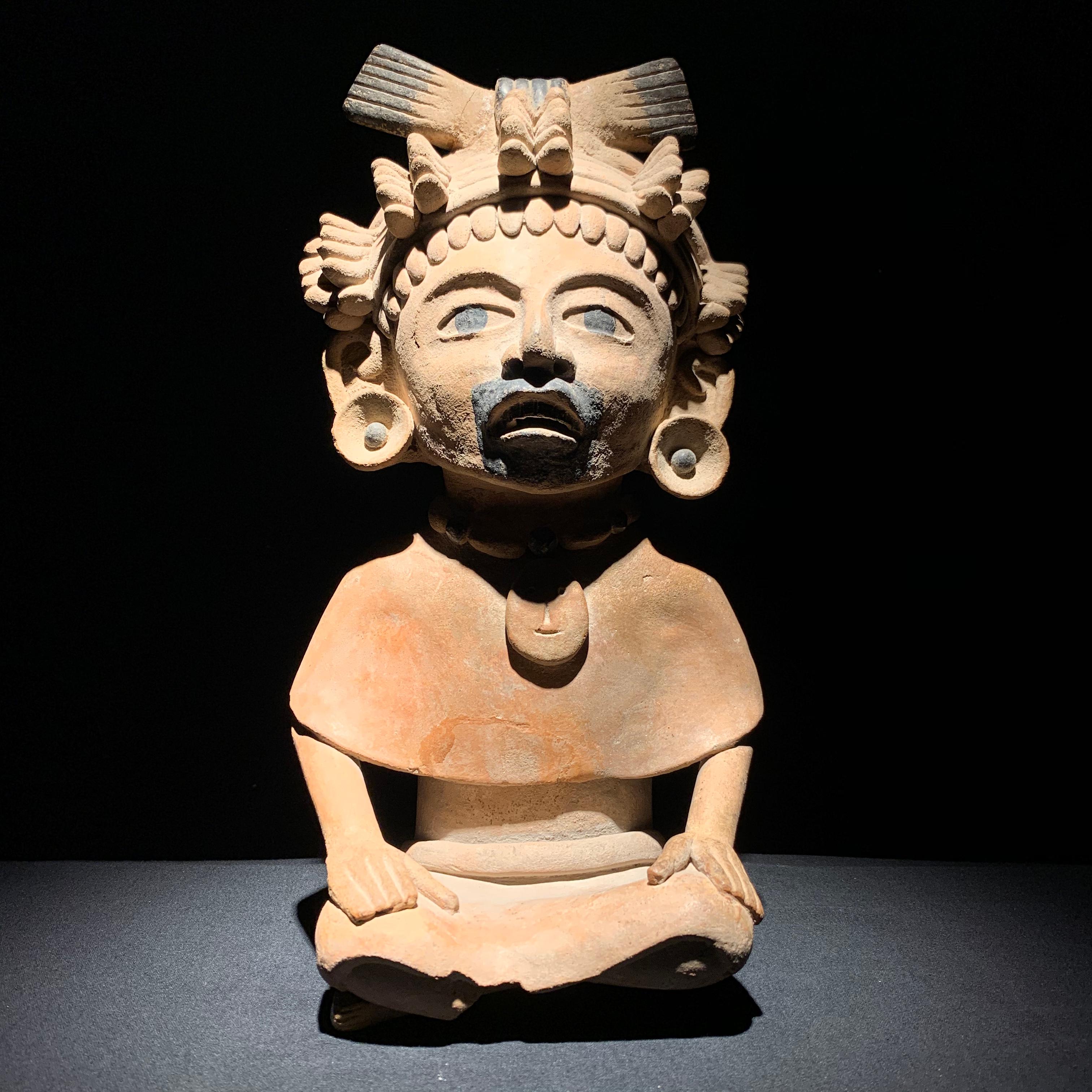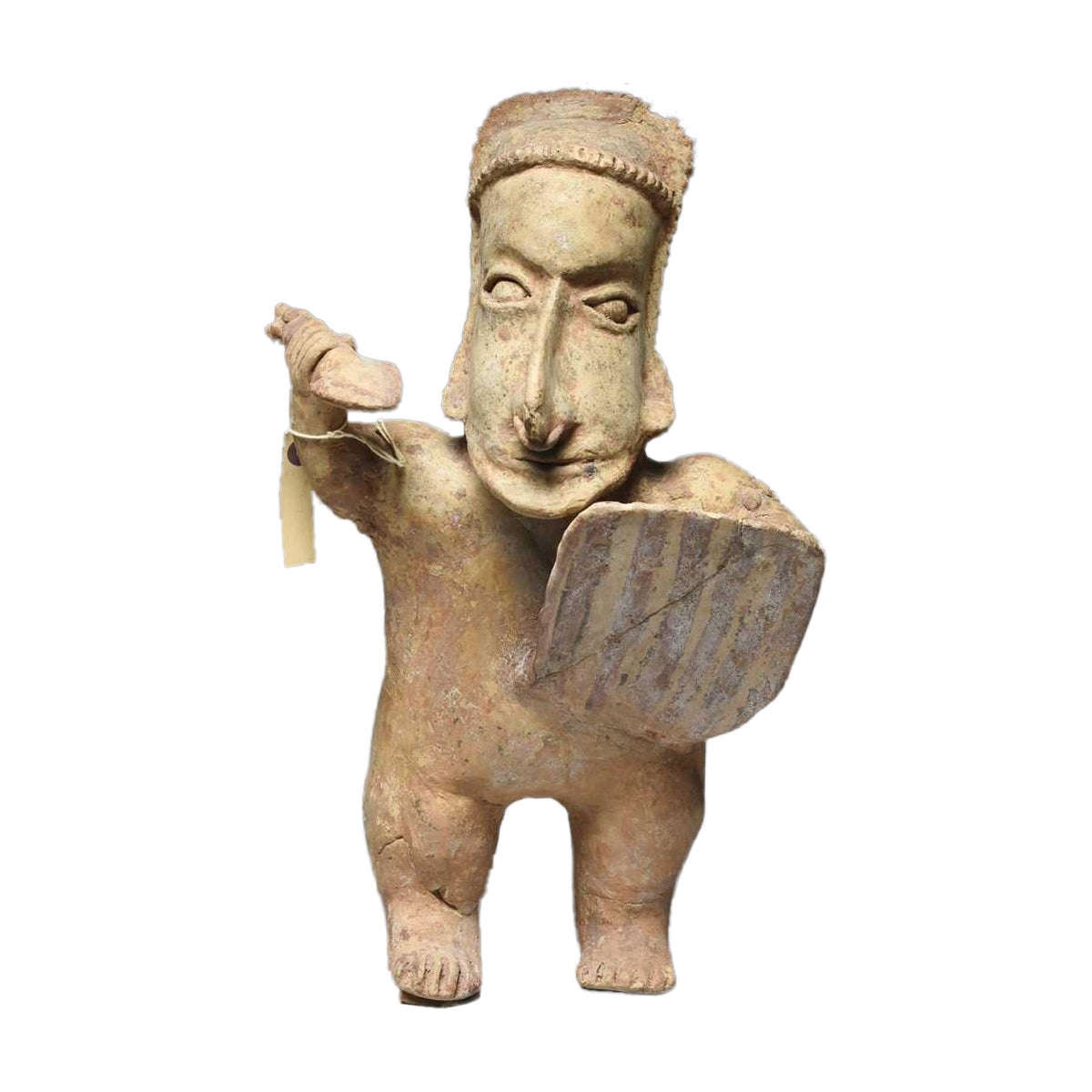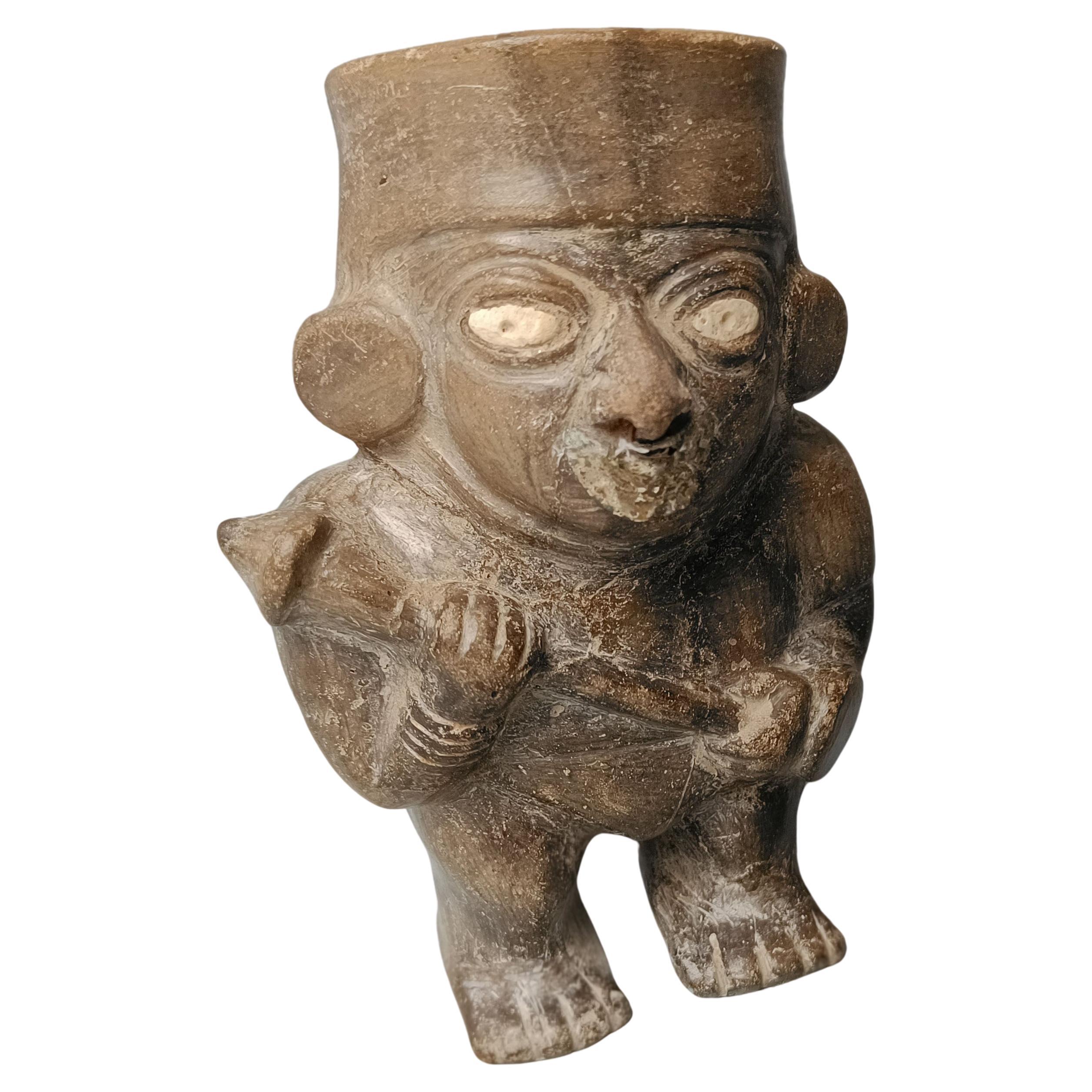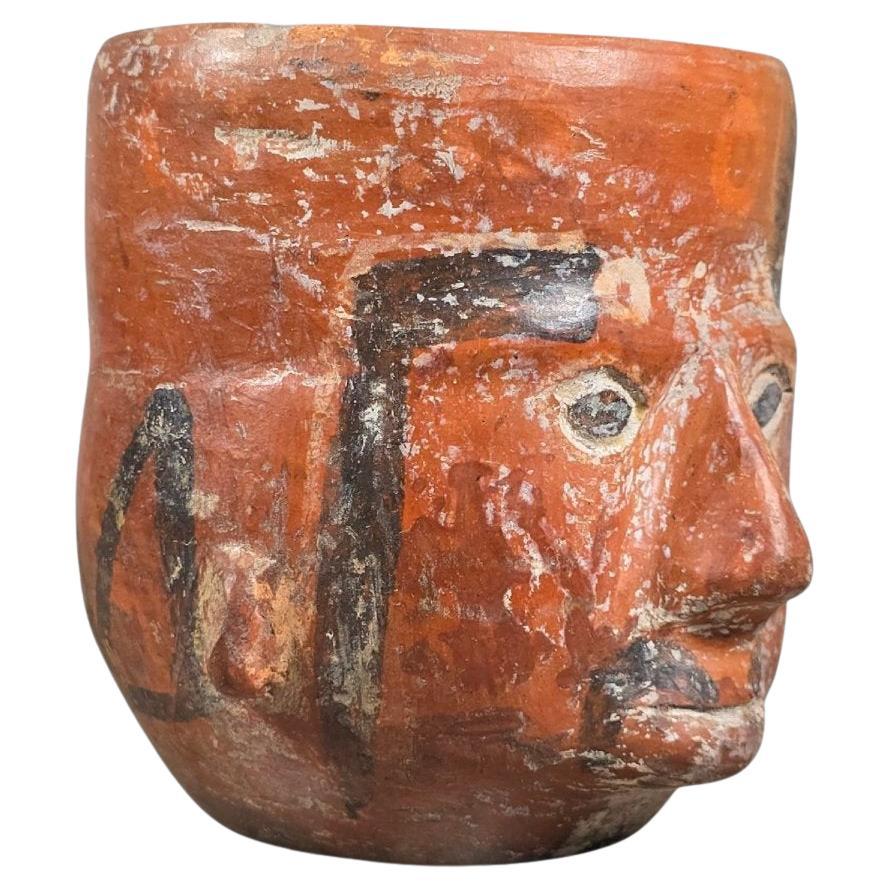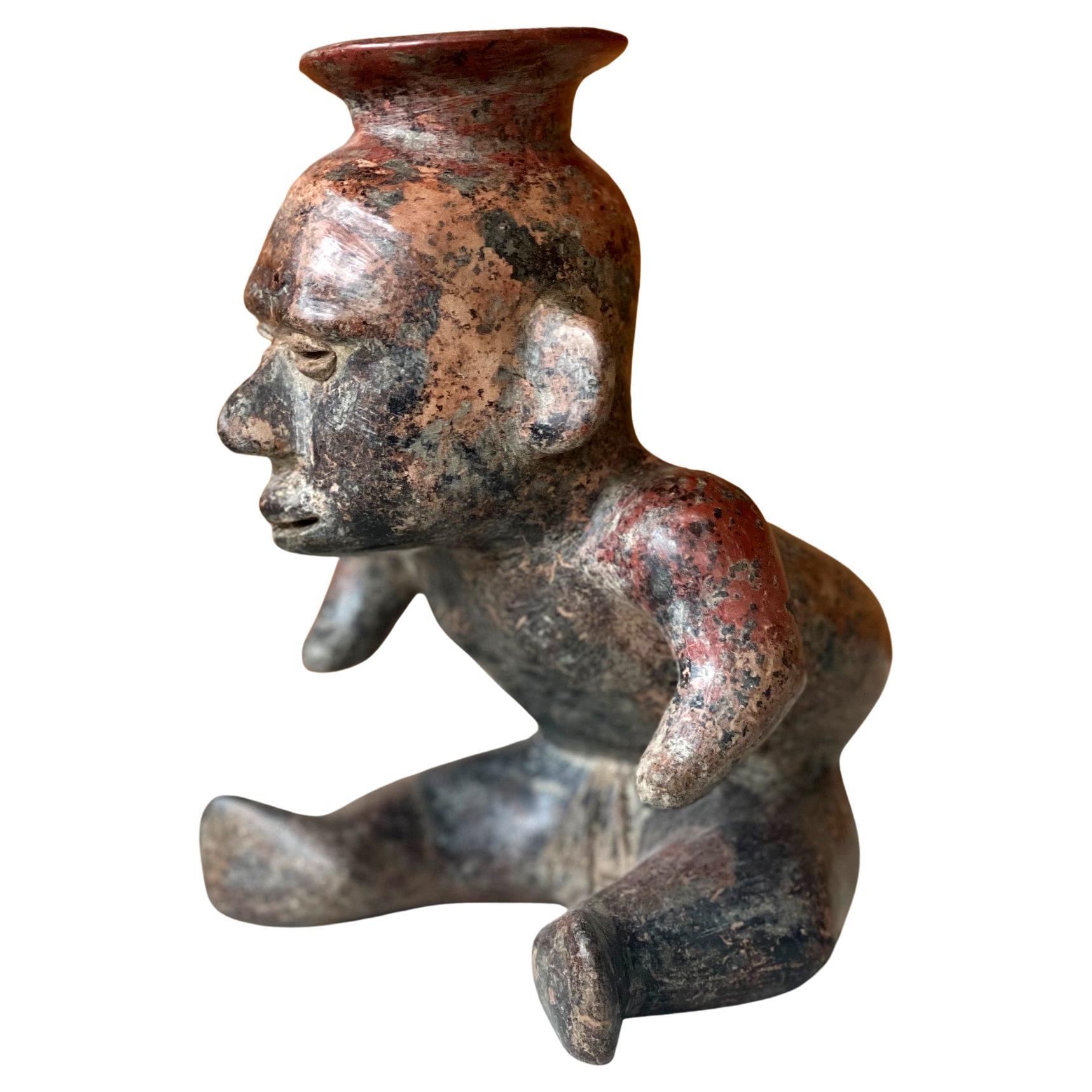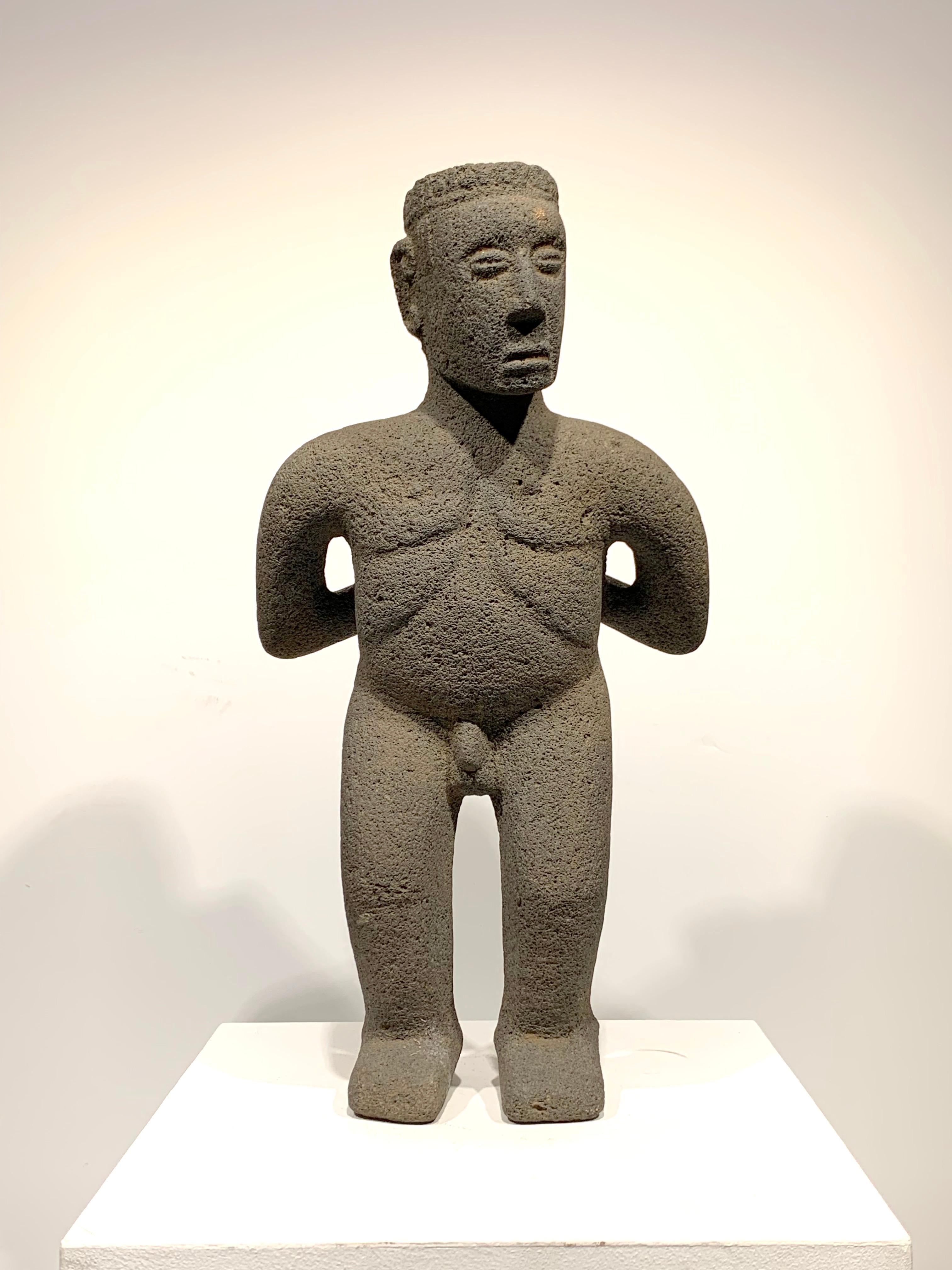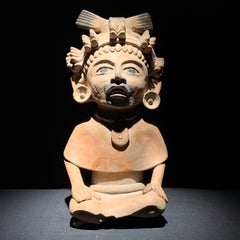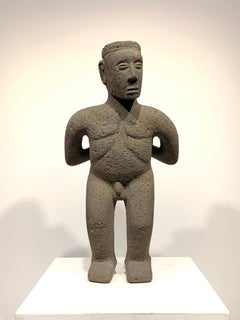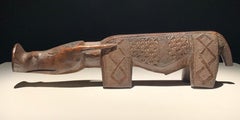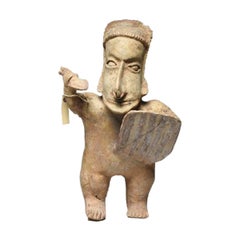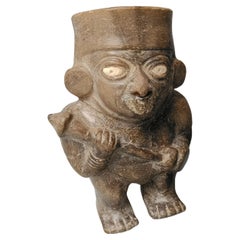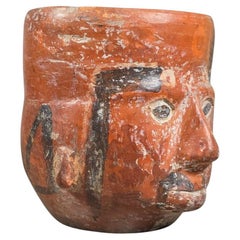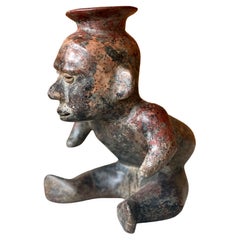Items Similar to Pre-Columbian Colima Shaman terracotta figure vessel Mexican sculpture
Video Loading
Want more images or videos?
Request additional images or videos from the seller
1 of 15
UnknownPre-Columbian Colima Shaman terracotta figure vessel Mexican sculptureca. 300 BCE - 300 CE
ca. 300 BCE - 300 CE
$6,000
£4,524.01
€5,232.69
CA$8,488.76
A$9,254.60
CHF 4,889.95
MX$113,809.84
NOK 60,802.63
SEK 57,237.62
DKK 39,062.95
About the Item
Seated Shaman
Colima culture
Mexico
ca. 300 BCE - 300 CE
Pre-Columbian, West Mexico, Colima, ca. 300 BCE to 300 CE. A hollow-cast and highly-burnished terracotta hunchback shaman figural vessel.
Hunchbacks were considered sacred in Pre Columbian cultures and are often depicted as shamans or as assistants to royalty. The shaman holds an oval vessel and shakes a rattle in his lively role within a feasting ritual. Feasting was one of the four most important themes portrayed in West Mexican art, along with kinship, status, and power (Butterwick, Heritage of Power, 2005, p. 12). Feasting ceremonies were an integral part of a community that solidified economic and social interaction within and between villages, engaging all levels of the society.
It is suggested that the rattles were peyote buttons which would be integral to any shamanic activity surrounding a religious feast. The known intoxicating liquids included octli, or pulque from agave plants, or tesvino, maize beer (Butterwick, in Townsend, ed., Ancient West Mexico, 1998, p. 103). This figure also wears the insignia of rank with the shell projection on the forehead secured with the incised band wrapped carefully around the chin and head. The stylized head faces the bowl with a solemn, determined visage comprised of coffee bean eyes, a pronounced pointed nose, pursed lips, and sensitively contoured facial planes, all topped by a caplike headdress with a horn rising from the center. A very unusual element is the small nose ring. The most curious aspect is the specific abnormality of the figure's spine. His back exhibits a protrusion not unlike an animal's tail, suggesting that the figure was based on a specific shaman. Overall, the graceful lines and studied proportions place this example among those of the highest distinction.
Colima, located on Mexico's southwestern coast, was during this time part of the shaft tomb culture, along with neighbors to the north in Jalisco and Nayarit. In this culture, the deceased were buried down shafts - ranging from 3 to 20 meters deep - that were dug vertically or near vertically through the volcanic tuff known as "tepetate" that makes up the geology of the region. The base of the shaft would open into one or more horizontal chambers with a low ceiling. These shafts were almost always dug beneath a dwelling, probably a family home, and seem to have been used as family mausoleums, housing the remains of many related individuals. Ornate vessels and finely modeled figures like this one were placed in the tombs in order to hold offerings and protect the soul of the deceased.
Condition: Thumb and bowl on left hand have broken off as one piece and have been reattached. Otherwise intact. Covered with nice burnishing marks.
All items legal to buy/sell under U.S. Statute covering cultural patrimony Code 2600, CHAPTER 14, and are guaranteed to be as described or your money back.
A Certificate of Authenticity will accompany all purchases
- Creation Year:ca. 300 BCE - 300 CE
- Dimensions:Height: 12 in (30.48 cm)Width: 12.25 in (31.12 cm)Depth: 8 in (20.32 cm)
- Medium:
- Period:
- Condition:
- Gallery Location:Wilton Manors, FL
- Reference Number:1stDibs: LU24525339032
About the Seller
4.9
Platinum Seller
Premium sellers with a 4.7+ rating and 24-hour response times
Established in 2007
1stDibs seller since 2015
417 sales on 1stDibs
Typical response time: 2 hours
- ShippingRetrieving quote...Shipping from: Wilton Manors, FL
- Return Policy
Authenticity Guarantee
In the unlikely event there’s an issue with an item’s authenticity, contact us within 1 year for a full refund. DetailsMoney-Back Guarantee
If your item is not as described, is damaged in transit, or does not arrive, contact us within 7 days for a full refund. Details24-Hour Cancellation
You have a 24-hour grace period in which to reconsider your purchase, with no questions asked.Vetted Professional Sellers
Our world-class sellers must adhere to strict standards for service and quality, maintaining the integrity of our listings.Price-Match Guarantee
If you find that a seller listed the same item for a lower price elsewhere, we’ll match it.Trusted Global Delivery
Our best-in-class carrier network provides specialized shipping options worldwide, including custom delivery.More From This Seller
View AllVeracruz Mexico Pre-Columbian ceramic Warrior figure sculpture
Located in Wilton Manors, FL
Figure of a Chanting Warrior
Ceramic with bitumen highlights
300-600 CE (Classic Period)
Mexico, Veracruz, possibly Nopiloa
Veracruz Culture
Pre-Columbian, Mexico, Vera Cruz culture...
Category
15th Century and Earlier Figurative Sculptures
Materials
Ceramic
$6,000 Sale Price
50% Off
Costa Rican pre-Columbian sculptural figure ca. 1000-1500
Located in Wilton Manors, FL
Magnificent standing figure, Costa Rica, ca. 1000-1500. Carved volcanic stone. Measures 16.5 x 9 x 5.5 inches. Outstanding condition with no damage.
The figure represents a captured...
Category
15th Century and Earlier Figurative Sculptures
Materials
Stone
Chimu Inca c.1500 Peruvian terra-cotta anthropomorphic face vase vessel Peru
Located in Wilton Manors, FL
Beautiful antique Peruvian face vessel. Chimu Inca, c.1500 Terracotta, measures h. 8 in., w. 4 7/8 inches. No repair or conservation.
Category
15th Century and Earlier More Art
Materials
Terracotta
$720 Sale Price
60% Off
Kuba African Warthog Divining Figure tribal arts sculpture
Located in Wilton Manors, FL
Warthog Divining Figure. Kuba, DRC. Late 19th century. Carved wood with palm oil patina, 12.5 incehes (l), 3.25 inches (h), 2 5/8 inches (d). Loss evident at tip of right ear and on snout.
Provenance: Ex. collection Martin and Faith-Dorian Wright; J.J. Klegman; Angelo Caggiula-Carulucci, chief magistrate in Belgian Congo for King Leopold...
Category
Late 19th Century Abstract Figurative Sculptures
Materials
Wood
Standing Figure
Located in Wilton Manors, FL
Tom Cramer (b.1960). Standing Figure, 1998. Carved wood and polymer paint. Measures 12 inches high. Excellent condition. Signed and dated under base.
Tom Cramer is an American artist working in Portland, Oregon noted for his intricately carved and painted wood reliefs and ubiquity throughout the city of Portland. Often called the unofficial Artist Laureate of Portland,[2] Cramer is one of the most visible and successful artists in the city. The influences on his work are both organic and technological. He is widely collected and is in many prominent west coast museum and private collections. He is in the permanent collections of the Portland Art Museum[3] in Portland Oregon, the Halle Ford Museum in Salem Oregon, the Jordan Schnitzer Museum in Eugene, Oregon, the Boise Art Museum in Idaho.
Cramer made a name for himself in the 1980s and 1990s becoming a bridge between historical Oregon artists like Clifford Gleason and Milton Wilson...
Category
Late 20th Century Neo-Expressionist Figurative Sculptures
Materials
Wood, Latex
Standing Figure
Located in Wilton Manors, FL
Tom Cramer (b.1960). Standing Figure, 1988. Carved wood and polymer paint. Measures 11.5 inches high. Excellent condition. Signed and dated under base.
Tom Cramer is an American artist working in Portland, Oregon noted for his intricately carved and painted wood reliefs and ubiquity throughout the city of Portland. Often called the unofficial Artist Laureate of Portland,[2] Cramer is one of the most visible and successful artists in the city. The influences on his work are both organic and technological. He is widely collected and is in many prominent west coast museum and private collections. He is in the permanent collections of the Portland Art Museum[3] in Portland Oregon, the Halle Ford Museum in Salem Oregon, the Jordan Schnitzer Museum in Eugene, Oregon, the Boise Art Museum in Idaho.
Cramer made a name for himself in the 1980s and 1990s becoming a bridge between historical Oregon artists like Clifford Gleason and Milton Wilson...
Category
Late 20th Century Neo-Expressionist Figurative Sculptures
Materials
Wood, Latex
You May Also Like
Pre Columbian Large Jalisco Figure West Mexico Circa B.C. 100-300 A.D
Located in London, GB
A Pre Columbian Jalisco warrior figure
Jalisco West Mexico circa B.C. 100-300 A.D,
A stunning large pottery warrior figure wearing a banded headdress with disco arm ornaments , ...
Category
Antique 15th Century and Earlier Mexican Antiquities
Materials
Pottery
Pre Columbian Rare Moche Warrior Vessel South Latin American Antiques Art
Located in London, GB
Pre-Columbian Moche Warrior Vessel – Moche V Period, 600–700 AD, Peru
A striking and rare example of Moche ceramic artistry, this Pre-Columbian greyware warrior vessel dates from th...
Category
Antique 15th Century and Earlier Peruvian Antiquities
Materials
Pottery
Pre-Columbian ceramics can– Tiahuanaco Culture
Located in Madrid, ES
"Pre-Columbian Ceramics – Tiahuanaco Culture"
Material: ceramics
Origin: Southern Sierra of Peru, Lake Titicaca Plateau
Period: Boom Age (1 AD – 800 AD)
Dimensions: 11 x 10 cm diamet...
Category
Antique 15th Century and Earlier South American Tribal Ceramics
Materials
Ceramic
Ceramic Pre-Columbian Colima Hunchback Figure Vessel
Located in Atlanta, GA
A pre-Columbian figural vessel from West Mexico Colima culture (circa 300BC-400AD). Made of molded clay, the stoneware vessel depicts a seated hunchback...
Category
Antique 15th Century and Earlier Mexican Pre-Columbian Figurative Sculpt...
Materials
Ceramic
Pre Columbian Terracotta Chimu Vessel Pottery
Located in West Hollywood, CA
Pre-Columbian terracotta Chimu vessel pottery - explore the rich history of ancient artistry with this unique artifact as an enduring testament to the artistic value of the ancient C...
Category
Antique 15th Century and Earlier Peruvian Pre-Columbian Vases
Materials
Terracotta, Pottery
Pre-Columbian Style Mexican Terracotta Statue, Molded Clay Figurative Sculpture
Located in Miami, FL
Vintage, decorative and well-proportioned Mexican primitive figure depicting a man seated, with detailed, patterned clothing. The sculpture measures
16 1/4" High x 12" wide x 9 1/2"...
Category
20th Century Mexican Pre-Columbian Figurative Sculptures
Materials
Clay
$1,520 Sale Price
20% Off
More Ways To Browse
Antique Figure Sculpture
Terracotta Figural
Coffee Bean
Terracotta Mexican
Pre Columbian Mexico
Mexican Antique Sculpture
Shaman Antique
Pre Columbian Vessel
Agave Plant
Antique Rattles
Pre Columbian Mexican Art
Pre Columbian Figure
Mexican Terracotta Sculpture
Pre Columbian Terracotta
Sell Antiques
Horn Headdress
Colima Sculpture
Michel Debieve
